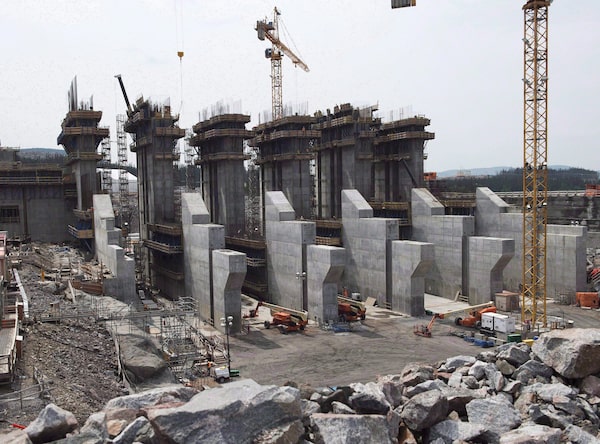
Prime Minister Justin Trudeau and Newfoundland and Labrador Premier Andrew Furey bump elbows at the College of the North Atlantic in St. John's, N.L., on July 28.Andrew Vaughan/The Canadian Press
Ottawa struck a $5.2-billion deal with Newfoundland and Labrador to help complete construction of the debt-plagued Muskrat Falls hydroelectric project, a tentative agreement that would keep electricity rates from almost doubling while alleviating pressure on a province in the midst of a deep fiscal crisis.
Muskrat Falls, which started with great optimism in 2013 on Labrador’s lower Churchill River, has ballooned into a financial albatross that’s now more than $6-billion overbudget and years behind schedule.
The details of the deal still need to be finalized by both governments. The proposed agreement would reduce the province’s cost of financing the project and keep Newfoundland’s electricity rates from spiking this fall when the hydro dam is fully online. At that point, ratepayers would begin to pay for Muskrat Falls through their power bills.
How Ottawa helped Newfoundland build the multibillion dollar fiasco that is Muskrat Falls
Who’s to blame for the Muskrat Falls bailout? It’s not who you think
Muskrat Falls project cost goes up by $435-million due to pandemic-related delays
As part of the agreement announced Wednesday, Ottawa would give annual cash transfers to Newfoundland and Labrador equal to what it makes from the Hibernia offshore oil project, estimated to be worth about $3.2-billion over the next 26 years.
Also included is $2-billion in financing, from a federal loan guarantee for the project and cash for Newfoundland’s portion of the Labrador-Island Link, the transmission system that carries Muskrat Falls’ power from central Labrador and distributes it across the island.
Liberal Premier Andrew Furey, who has vowed to turn around the province’s pervasive financial problems, said the deal means Newfoundlanders no longer have to worry about soaring power bills. The agreement would subsidize electricity rates that were set to rise to the highest among Canadian provinces.

The hydroelectric facility at Muskrat Falls, N.L., under construction on July 14, 2015. Without the deal, electricity rates were set to rise sharply in Newfoundland, from 13 cents per kilowatt hour to just under 23 cents – higher than anywhere else in Canada apart from the territories.Andrew Vaughan/The Canadian Press
Easing some of the financial burden from Muskrat Falls is seen as a first step in Newfoundland’s efforts to dig out of a crippling fiscal situation with total provincial debt now more than $47.3-billion.
“What a huge day for Newfoundland and Labrador,” the Premier said Wednesday. “Today, the weight begins to lift and we can all breathe a measured sigh of relief.”
Prime Minister Justin Trudeau, in St. John’s for the announcement, acknowledged “significant mistakes” had allowed the Muskrat Falls project to balloon out of control, but said Canadians need to help each other.
“The pressures and challenges faced by Newfoundlanders and Labradorians for mistakes made in the past is something that Canadians all needed to step up on, and that’s exactly what we did,” he said.
Mr. Trudeau added that his government sees access to clean electricity as a priority in Atlantic Canada, and said support for hydroelectric power in Newfoundland is part of a broader plan to reduce emissions in Canada and fight climate change.
Mr. Trudeau’s visit to Newfoundland took place as part of a swing this week through Atlantic Canada that has included stops in New Brunswick and Prince Edward Island, where the Prime Minister announced that the province was signing on to a child-care agreement with the federal government. A similar agreement was announced for Newfoundland Wednesday, in which the province will receive more than $347-million through 2025 to eventually enact $10-a-day child care.

A young boys smiles for the cameras as Prime Minister Justin Trudeau, left, Education Minister Tom Osborne and Newfoundland and Labrador Premier Andrew Furey engage with children at the College of the North Atlantic in St. John's, N.L., on July 28. The province has struck a deal with Ottawa for a $10-a-day child-care program.Andrew Vaughan/The Canadian Press
Mr. Trudeau has been sidestepping media questions about electioneering ahead of a campaign expected in the coming weeks. The federal Liberals have six of seven seats in Newfoundland and Labrador.
NDP MP Jack Harris, who holds the province’s seventh seat, in St. John’s East, said the “creative restructuring” of Muskrat Falls’ debt comes after what he called an unintended windfall Ottawa received from the Hibernia oil project. He said the deal still won’t protect ratepayers from his province’s rising electricity costs.
“The significant cost overruns on Muskrat Falls have created a serious burden for Newfoundlanders and Labradorians who should not be penalized for the problems,” he said. “This agreement will not stop the already too-high rates for Newfoundlanders and Labradorians from increasing.”
Earlier this week, federal Conservative Leader Erin O’Toole was also in Newfoundland, and promised a fix to the Fiscal Stabilization program, designed to help provinces deal with economic challenges, that would yield up to $70-million for the province.
The Bloc Québécois’ natural resources critic denounced the hydroelectric agreement, saying it will harm Quebec and lead to competition with Hydro-Québec in export markets.
“All this to buy votes in Newfoundland with our money,” Mario Simard said in a statement.
He said Mr. Trudeau’s government is directly attacking Hydro-Québec, which has been trying for several years to increase its electricity sales in the United States, one of the markets targeted by Muskrat Falls. The deal announced today is in addition to $7.9-billion already provided by Ottawa as a loan guarantee, he said, for a total of $13-billion – or $25,000 per Newfoundlander.

Muskrat Falls megadam opponents hold a rally on Parliament Hill in Ottawa on Oct. 29, 2018. Wednesday's Muskrat Falls announcement was met with some protest in St. John’s, including by those opposed to further hydroelectric development in Labrador.Sean Kilpatrick/The Canadian Press
“The Muskrat Falls circus must stop,” Mr. Simard said. “To offer such a gift of $25,000 to Quebecers, he would have to transfer $210-billion.”
The proposal to give Newfoundland revenue from the Hibernia offshore oil project offers “political cover” to a federal government concerned about the optics of writing big cheques for some provinces and not others, said Russell Williams, a professor of political science at Memorial University in St. John’s. But there remains questions about how much value is actually left in the oil field, which was first discovered in 1979 about 315 kilometres southeast of St. John’s, he added.
“It’s a bailout. It’s a bailout that they’re trying to make look not like a bailout,” he said.
“Provincially, finding some sort of financial alchemy to keep rates from going up is so important because the government is so invested in that politically. But it’s not clear how much this actually digs the province out of its broader fiscal crisis.”
The Muskrat Falls announcement was met with some protest in St. John’s, including by those opposed to further hydroelectric development in Labrador. The Grand Chief of the Innu Nation in the province, Etienne Rich, said he wasn’t consulted on the proposed deal. He said he was concerned about an unresolved land claim with Ottawa that would give his people the right to approve any future hydroelectric projects on their traditional land in Labrador.
Mr. Furey rejected the idea that the Innu people have been left out of the talks, noting that there was a briefing with them this week, and they were part of the technical briefing Wednesday.
Newfoundland Progressive Conservative Leader David Brazil, the last remaining PC MLA who was in office when the Muskrat Falls project began, said he hoped the deal marks a new turning point for the province. It stabilizes the project’s debt, eases pressure on power bills and opens the door to new hydroelectric projects, he said.
“This is big step forward. This has consumed everybody’s lives for the past five or six years. There was fear electricity rates could double, and we’ve got a lot of people on fixed incomes,” he said.
Without the deal, electricity rates were set to rise sharply in Newfoundland, from 13 cents per kilowatt hour to just under 23 cents – higher than anywhere else in Canada apart from the territories. Rates will now rise to 14.7 cents, about a 10-per-cent increase, and increase annually by 2.25 per cent after that.
Your time is valuable. Have the Top Business Headlines newsletter conveniently delivered to your inbox in the morning or evening. Sign up today.